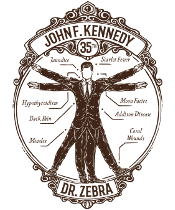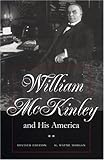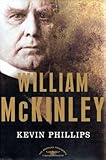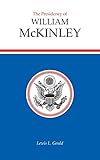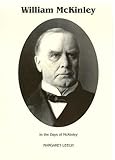

Health and Medical History of President
William McKinleyLived 1843-1901
Health and Medical History of President
William McKinleyLived 1843-1901
1776-1783
1812-1815
1846-1848
1861-1865
1898-1899
1917-1918
1941-1945
1950-1953
1964-1975
1990-1991
2001-2021

| UNDER CONSTRUCTION |
McKinley had a remarkable memory for faces and names... Once, while waiting for ceremonies to begin at the dedication of a monument at the Antietam battlefield, he walked over to the edge of the platform and called down to an old veteran in blue, "Hello, comrade, I saw you in the crowd at Gettysburg last month when I spoke there, didn't I?" Astonished, the veteran exclaimed, "Yes, but how did you recognize me?" Queried about his memory afterward, McKinley shrugged it off: "Oh, I don't know, it just comes naturally."
Comment: This is a clear illustration that politics always has been, and always will be, a nasty business. McKinley's manhood should not have been open to challenge, given that he enlisted in the Army at age 17, just weeks after the Civil War began at Ft. Sumter, and that he served in the field virtually the entire war, including the battles of South Mountain, Antietam, Winchester, Cedar Creek, and countless others 4a.
He underwent surgery within hours. He survived the operation, but died on the ninth post-operative day. Both his post-operative course MORE 7a and his autopsy MORE 7b have been meticulously documented 8 9.
There was intense controversy about McKinley's medical care MORE. Some thought that McKinley could have been saved had renowned surgeon Roswell Park performed the operation MORE. More recent commentators believe, however, that McKinley died from pancreatic necrosis, a condition which is still difficult to treat today, and which the surgeons of McKinley's time could not have treated or prevented 1.
- Like
James Polk,
and unlike
Woodrow Wilson,
McKinley paid great attention to his handshake. Boller notes
2b:
McKinley's handshake was famous. To save wear and tear on his right hand at receptions, the President developed what came to be called the "McKinley grip." In receiving lines, he would smile as a man came by, take his right hand and squeeze it warmly before his own hand got caught in a hard grip, hold the man's elbow with his left hand, and then swiftly pull him along and be ready to beam on the next guest. MORE
Pendel says 6b: "The President always took great delight in shaking hands with the people. He told one of the officials at the White House that he took more delight in shaking hands with the people than he did at one of the state dinners. It seemed to be a great gratification to him to meet the masses of the people." - Pendel 6c says: "President McKinley was a remarkable man; he was genial, a natural magnet. He drew the masses of the people to him. Always had a kind word, greeting with the extension of his hand every one that called on him, and endeavored to make them feel happy and at home."
- McKinley's wife, Ida, was subject to headaches and seizures. In order to attend to her, if necessary, McKinley broke tradition and sat next to her at official dinners. For example, one evening at dinner with William Taft, "a peculiar hissing sound" came from Mrs. McKinley. McKinley quickly picked up a napkin, dropped it over her face, and continued talking. Mrs. McKinley recovered a few moments later, and resumed her part in the conversation where she had left off 2c. To those around them, "They were a very happy man and wife" 6d.
- Seldes charges that editorials in the New York Journal inspired McKinley's assassin. He claims that "the only man in public life courageous enough to say so was Theodore Roosevelt." 10a
- As an attorney, McKinley once used of medicine's oldest techniques to win a malpractice suit brought against his client, a surgeon. MORE
- Army general Dr. Leonard Wood and surgeon general Dr. George Sternberg may have been McKinley presidential physicians before Rixey (see below). Dr. William Osler consulted on Mrs. McKinley. (I cannot now find where I read this. However, 11 quotes from Osler's own summary of 1901: "Two consultations at the White House and several Cabinet Ministers are responsible for a considerable increase in patients from the Capital." It is also possible that Osler was referring to Theodore Roosevelt's White House.)
- In June 1925, Dr. Presley M. Rixey, White House physician to both McKinley and Theodore Roosevelt, wrote an article called "Guarding the Health of Our Presidents" for a popular magazine called Better Health. Once accustomed to the author's ego, the article is an interesting narrative of a serious illness Mrs. McKinley suffered while traveling. It is also a reminder of the way antibiotics have changed the way humans live... and die. MORE 7c
- Presley Marion Rixey
- George McKenzie Hall
- Joseph Fowler
- Devillo W. Harrington
- Edward Wallace Lee
- Edward Cox Mann
- Matthew Derbyshire Mann
- Burton Thorne Simpson
- Herman Mynter
- Roswell Park
- John Parmenter
- Charles G. Stockton
- Willis D. Storer
- Peter W. Van Peyma
- Eugene Wasdin
- Eugene Wasdin
- Nelson Waltrow Wilson
- Edward Gamaliel Janeway
- William Waring Johnston
- Charles McBurney
- Fisher, Jack. Stolen Glory: The McKinley Assassination. Alamar Books, 2001.
a p.60 b p. xii c p.77
- Boller, Paul F. Jr. Presidential Anecdotes. New York: Oxford University Press, 1981.
 a p.189 b p.188 c pp.189-190
a p.189 b p.188 c pp.189-190 - Page, Susan. Time-tested formulas suggest both Bush and Kerry will win on Nov. 2. USA Today. June 23, 2004.
Comment: Accessed through usatoday.com: http://www.usatoday.com/news/politicselections/nation/president/2004-06-23-bush-kerry-cover_x.htm
- Halstead, Murat. The Illustrious Life of William McKinley, Our Martyred President. 1901.
a pp.114-121
- Butt, Archibald W. Taft and Roosevelt: The Intimate Letters of Archie Butt, Military Aide. Garden City, NY: Doubleday (1930). Volume 1: pages 1-432. Volume 2: pages 433-862.
a pp.733-734
Comment: Butt, an Army officer, was military aide first to President Theodore Roosevelt and then to President William Taft. On April 14, 1912, Butt was at sea aboard the Titanic returning from a European vacation that Taft had insisted he take. President Taft later said: "When I heard that part of the ship's company had gone down, I gave up hope for the rescue of Major Butt, unless by accident. I knew that he would certainly remain on the ship's deck until every duty had been performed and every sacrifice made that properly fell on one charged, as he would feel himself charged, with responsibility for the rescue of others." Taft was correct. Butt did not survive the sinking.
- Pendel, Thomas F. Thirty-Six Years in the White House. Washington: Neale Publishing Company, 1902.
 a pp.156-157 b p.160 c p.166 d p.161
a pp.156-157 b p.160 c p.166 d p.161Comment: Pendel was door-keeper at the White House from the time of Lincoln to the time of Theodore Roosevelt. Full text is available on-line at loc.gov. It is a rather dry book, and reads as if it were written by an old man. http://memory.loc.gov/cgi-bin/query/D?lhbcbbib:1:./temp/~~ammem_rEou::
- Braisted, William C.; Bell, William Hemphill; Rixey, Presley Marion. The Life Story of Presley Marion Rixey: Surgeon General, U. S. Navy 1902-1910: Biography and Autobiography. Strasburg, VA: Shenandoah Publishing House, Inc., 1930.
a pp.51-70 b pp.71-82 c pp.454-461
Comment: Dr. Rixey was the White House physician for both William McKinley and Theodore Roosevelt.
- Rixey, PM; Mann, MD; Mynter, H; Park, R; Wasdin, E; McBurney, C; Stockton, CG. Death of President McKinley. J.A.M.A. 1901;37:779.
- Rixey, PM; Mann, MD; Mynter, H; Park, R; Wasdin, E; McBurney, C; Stockton, CG. The official report on the case of President McKinley. J.A.M.A. 1901;37:1029.
- Seldes, George. Witness to a Century. New York: Ballantine Books, 1987.
 a pp.28, 382
a pp.28, 382 - Bensley EW, Bates DG. Sir William Osler's autobiographical notes. Bull Hist Med. 1976; 50: 596-618.
